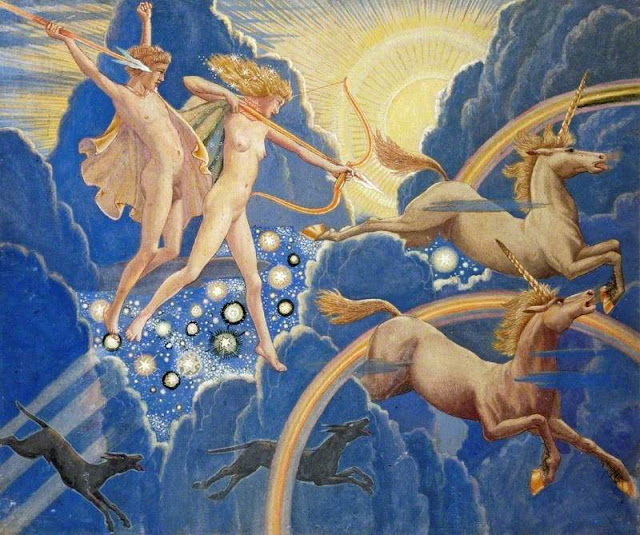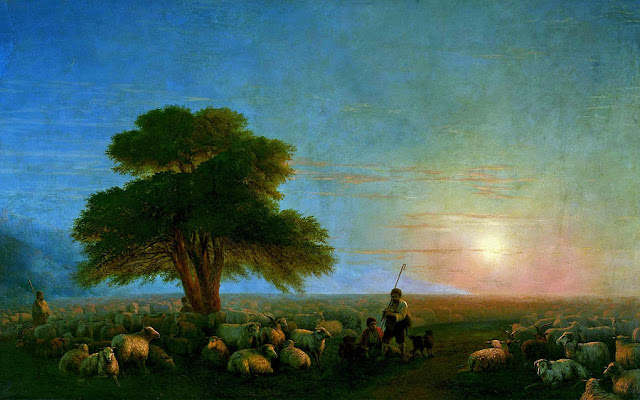"There is a line
of Homer, which I forget, which tells of mules going up a mountain pass, and
you can hear the clatter of their hooves; and another tells of Apollo going
back in anger to Olympus, and his quiver against his armour booms as it goes.
And then there is Virgil’s line, though Latin can never quite equal Greek:
Quadrupedante
putrum sonitu quatit ungula campum*
which tells of a
horse galloping, without the aid of meaning, for the sound can be detected
without knowing Latin. But these are are rare instances in which the magician
has written his spell without mystery in plain earthly lettering; where the
mortal ear can detect known words among the notes with which the spirit is
called by the horns of elfland, and are not enough to enable us to decipher the
other spells which give its power to metre. There must be rhythms in our hearts
too deep for the eyes of scientists, rhythms which rhyme with these rhythms,
all in harmony with some ancient order that may be called the technique of Creation.
"Well, I cannot explain it, but let
us always remember that it is there; never let us read poetry as though it were
prose, and let us never wrong a poet by reading one of his lines for instance
like this:
Captain
or col’nel or knight in arms.
"That is a jingle
that ruins the stately form of a sonnet. It is not that you know how to
pronounce the word colonel; that is a
very trivial matter: the point at issue is whether Milton knew how to write a line of a sonnet. If he did, it must be obvious that he pronounced colonel as a
three-syllable word, as it is written:
Captain or colonel or knight in arms
is a fine line
opening a sonnet; it is like the beginning of a wide avenue leading up to a
great house; the other is like a gap in a wire fence that rattles as you break
through. Look again at the difference between the two lines ‘Captain or col’nel
or knight in arms’ and ‘Captain or colonél or knight in arms’. You must not rob
a poet of one of his syllables; it is like leaving out one of the black
Cathayan letters from a magician’s spell; it is like pinching the horns of
elfland and slightly narrowing them, so that they will not sing to you.
"Remember that this thing that I
cannot explain is of the first importance, and that without it the music breaks
down, even though you can read poetry in translation, which of course has the
same effect on this particular magic that lead has on X-rays; but what happens
is that our reason, which is not so near to Heaven as our emotions, is
nevertheless able to see that much; it travels by its own power the paths of a
wonderful country, but its hand is not held by a spirit leading it to
fairyland.
"If then the metre is a spell whereby
something is enchanted and brought in its transmuted form into sight of our
mind’s eye, what then is the material which the spell transmutes or enchants?
Well, one kind of material is somewhat similar to the base metals of the
philosophers which they sought to change by means of alchemy; it is this world
of ours, all the paths along which men walk and the fields lying about them.
Indeed, roughly speaking, that was the principal material of all the poets up
to the age of Stephenson. I do not mean the poet Stevenson, but that great
inventor who, with James Watt, may have been whom Shahrazad prophetically had
in mind when she told the story of the fisherman who released an evil spirit
from a brass bottle, in which he had much better have stayed. These two men set
rhythms going, and made certain changes in the British Isles that I need not go
into, from which the poets began to turn away. It was only a tendency; they
continued to write mainly about the world we know; but I think that strange
remote poems like Khubla Khan and most of the country of Edgar Allan Poe and
some of Shelley, like none of Wordsworth, are more frequent in the age of the
steam-engine than they were before it. I think that in our own time there is a
tendency to give Pegasus a rather longer gallop, to get away from the streets
that have no longer the beauty of the country near Cork, which they say Spenser
found good enough for the landscape of his Faery Queen.
"Of the Irish poets of our own time, the one who most
habitually told of the fields around him was Francis Ledwidge. When he fled
from this city, in which he had been apprenticed to a grocer, he did not flee
like Coleridge in spirit to China, but in bodily form no further than a body
can go on foot in a day, the thirty miles from here to Slane. And there he
wrote one of his earliest poems, one verse of which goes like this:
Above me smokes the little town
With its white-washed walls and roofs of brown
And its octagon spire tones smoothly down,
As
the holy minds within.
And wondrous impudently sweet,
Half of him passion, half conceit,
The blackbird calls adown the street
Like
the piper of Hamelin.
"A.E. also wrote
of Irish fields, but as though a spirit were constantly calling to him from
India, and from times long past, and he seemed to see in the twilight, on hills
familiar to all of us, figures of kings long dead, and shapes of gods remote
from our Irish imagination. Yeats, it seemed to me, wrote of a stranger country; and, though he called it
Ireland, it still remains strange to us; while James Stephens writes of things
very near to our doors, things we might meet with in the streets of this city,
but rather as though it were he that had come from far away to peer with bright
eyes at our familiar things. Perhaps a leprechaun that had lost its way on a
red bog far in the west and strayed to this city might write of our
surroundings in some such way, sometimes deriding us for living here, where the
horizon peeps so seldom over the end of a street, and sometimes resentful at
being kept so far from the heather.
"And I cannot speak of Irish poets,
writing of Ireland in our time, without quoting a poem by Mr. H.L. Doak, which
has always seemed to me to be quite perfect. It was written during the last war
[World War I] and was called ‘Johnny Durney’:
As into Dublin I rode down
With wonder I was filled,
The way they said in Blanchardstown
“Young
Johnny Durney’s killed.”
Men leaned upon the spade to hear,
And women
wiped their eyes,
And all because a lad grown dear
In a far
country lies.
Great kings have made a bigger stir,
And yet
have missed romance.
But here’s an Irish villager
Has got a
grave in France.
Maybe a grand man fired the shot –
He laid a
grander low.
Who’s Johnny Durney? Ask me not.
None but
his own folk know.
"One of the
ingredients of poetry, then, is the world that we say we know, but that we do
not always know very well until this enchantment of which I have spoken
illuminates it, and our eyes see things clearly for the first time. The
commonest things, things lying all round about us, and often to be seen from a
nursery window, are for instance the usual material of Walter de la Mare; but
he comes into the nursery like a witch, or a
good fairy, always enchanting whatever he touches. This simple material,
a flock of sheep, a dog and a shepherd, is shown in a poem that I will read to
you – as also this enchantment.
Softly along a road of evening
Through a
twilight dim with rose
Wrinkled with age and drenched with dew
Old Nod the
shepherd goes.
His drowsy flock streams on before him,
Their
fleeces charged with gold,
To where the sun’s last beam leans low
On Nod the
shepherd’s fold.
The hedge is quick and green with briar,
From their
sand the coneys creep;
And all the birds that fly in heaven
Flock
singing home to sleep.
His lambs outnumber a noon’s roses,
Yet, when
night’s shadows fall,
His blind old sheep-dog, Slumber-soon
Misses not
one of all.
His are the quiet steeps of dreamland,
The waters
of no-more-pain,
His ram’s bell rings ’neath an arch of stars,
‘Rest,
rest, and rest again.’
[* 'The
four-footed galloping horse-hooves shake the crumbling plain.' Virgil's Aeneid: tr: J. W. Mackail]
Picture credits:
The Pleiades - by Bernard Sleigh (1872-1954)
The Horns of Elfland - by Bernard Sleigh (1872-1954)
Faun Whistling at a Blackbird - by Arnold Böcklin (1827-1901)
The Last General Absolution of the Munsters at Rue du Bois - by Fortunio Matania (c. 1915)
Shepherd with flock of sheep - by Ivan Konstantinovich Aivazovsky (1817-1900)



.JPG)

